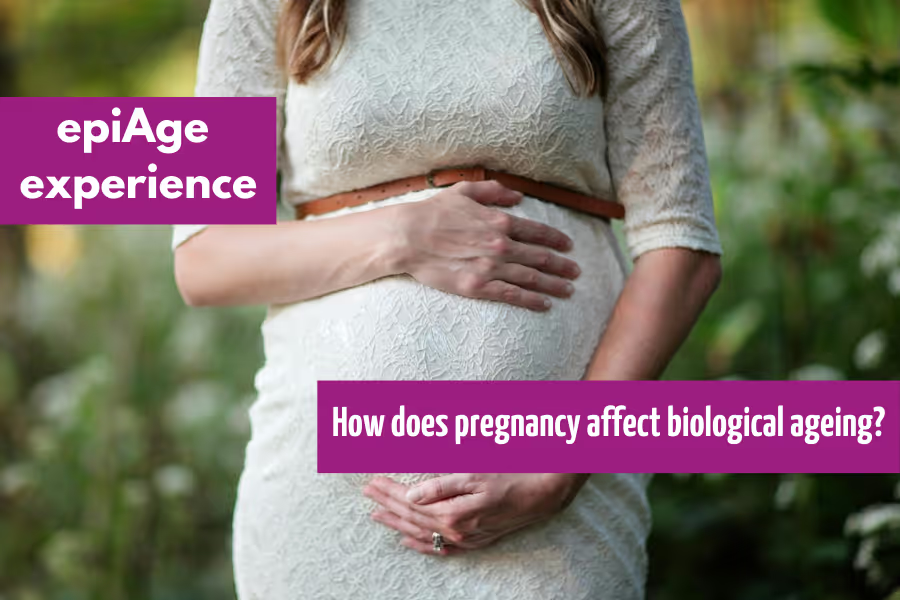In the life of many women, pregnancy is a very special time. The little alien colonising its mother’s innermost sanctum is enjoying one of the closest bonds we get to experience in a lifetime. Not only is the womb the world’s best “bed and breakfast”, but the maternal body’s entire physiology quite literally revolves around providing optimal growth and incubation conditions for its offspring.
Seen from this perspective, it appears plausible that pregnancy can be equated with a form of stress, hence epigenetic ageing, as the body accommodates to these huge changes. In 2023, a team of researchers (cf. Poganik et al. Cell Metabolism, 2023) examined the effects of major surgery, severe COVID-19 and pregnancy on mice and humans and were able to demonstrate that these life events indeed caused a detectable strain – even if mostly temporary. A new article (Pham et al. Cell Metabolism 2024) bolsters these pregnancy findings while also confirming that, post-partum, biological age normalises: “We note that the magnitude of the decrease in maternal biological age from the pregnant to non-pregnant state was about 2 to 3 times more than the increase in biological age from early to late pregnancy, indicating a pronounced reversal of biological aging.“ Furthermore, this team was able to uncover a link between the increase or decrease of biological aging and maternal pre-pregnancy Body Mass Index (BMI) as well as breastfeeding.
This should come as a relief to health- and longevity-conscious women, highlighting women’s bodies as extraordinarily resilient.
At epiAge, we are of course always curious to test current findings and hypotheses, but we rarely have the privilege of monitoring a pregnant woman. Luckily for us, a generous test-person volunteered to take two tests – one during very late pregnancy (her child was born a couple of weeks later) and the next one roughly 10 months post-partum. The mother to be had been eating well, exercising regularly and catching plenty of sleep before and during her pregnancy. Additionally, with a BMI of 18,6 she seemed particularly well equipped to withstand pregnancy stress.
The first time around, her biological age was 39.28 (over 4 years younger than her chronological age). And the second test revealed a biological age of 40.55 – an increase of a little more than a year of biological age over a chronological period of 10 months. While this obviously does not qualify as a decrease in biological age, it is still pretty impressive in terms of consistency. Indeed, as our test-person emphasised it, the post-partum phase is also characterised by less opportunities to exercise as well as by significant sleep deprivation (3 hours a night for many months, as she reported).
So, when taking these factors into account, pregnancy does not appear to be such a watershed moment for the biological age of most healthy mothers. However, it can never be overemphasised that pregnancies proceed in very individual ways. Even for the healthiest and most experienced of mothers, there are no “plain sailing” guarantees that you will be spared morning sickness, heartburn, diabetes, bloating, varicose veins, preeclampsia or depression… hence additional stress for the body.
What about you? Did you happen to test your biological age before, during and/or after pregnancy? If so, we are curious to hear about your experience!
Sources
Jesse R. Poganik, Bohan Zhang, Gurpreet S. Baht, Alexander Tyshkovskiy, Amy Deik, Csaba Kerepesi, Sun Hee Yim, Ake T. Lu, Amin Haghani, Tong Gong, Anna M. Hedman, Ellika Andolf, Göran Pershagen, Catarina Almqvist, Clary B. Clish, Steve Horvath, James P. White, Vadim N. Gladyshev, „Biological age is increased bystress and restored upon recovery“. Cell Metabolism, Volume 35, Issue 5,2023, Pages 807-820.e5, https://doi.org/10.1016/j.cmet.2023.03.015. Online: https://www.cell.com/cell-metabolism/fulltext/S1550-4131(23)00093-1?_returnURL=https%3A%2F%2Flinkinghub.elsevier.com%2Fretrieve%2Fpii%2FS1550413123000931%3Fshowall%3Dtrue
Pham H,Thompson-Felix T, Czamara D, Rasmussen JM, Lombroso A, Entringer S, Binder EB, Wadhwa PD, Buss C, O'Donnell KJ. “The effects of pregnancy, its progression,and its cessation on human (maternal) biological aging”. Cell Metab.2024 Mar 19:S1550-4131(24)00079-2. doi: 10.1016/j.cmet.2024.02.016. Epub ahead of print. Online: https://www.cell.com/cell-metabolism/abstract/S1550-4131(24)00079-2?_returnURL=https%3A%2F%2Flinkinghub.elsevier.com%2Fretrieve%2Fpii%2FS1550413124000792%3Fshowall%3Dtrue
Illustration
Leah Newhouse / pexels and epiAge
 Back to all posts
Back to all posts